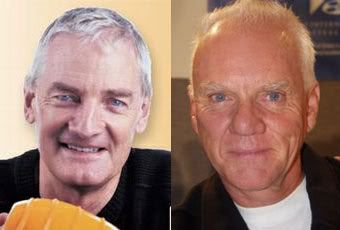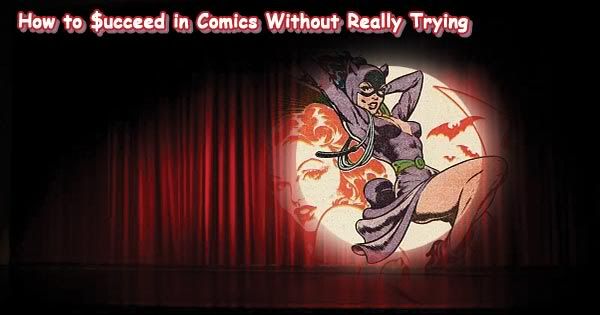I got caught up on quite a lot this weekend, but one thing I didn’t get to was the blog. I had tagged a piece from Aaron Sorkin’s acceptance speech at the Golden Globes a few weeks ago. In the final seconds, he thanked the female nominees “for helping to demonstrate to my young daughter that ‘Elite’ is not a bad word, it is an aspirational one.”
I hadn’t decided where to go from that starting point, until this morning when the first news I saw was the death of Hollywood composer John Barry. Barry produced some of the most transcendent film scores: Somewhere in Time to Dances With Wolves, Body Heat to Chaplin. Making any music that can transport the listener is an extraordinary gift, but to do it in movies where it’s not all about you, using your talents to contribute to this larger thing and taking it to a higher level, that goes beyond mere excellence into the realm of the extraordinary.
Being the best at what you do is not a bad thing, it is something to aspire to. Starting off with more talent, insight or smarts, that’s a gift, not something to be ashamed of. Studying and working hard to make the most of your talents, that is honoring the gift. Challenging yourself, pursuing excellence for its own sake, these are all good things.
Robert Browning said a man’s reach should exceed his grasp, or what’s a heaven for?
The Handicapper General of Vonnegut’s Monkey House said you should strap weights to the ankles of a ballerina.
The flock in Jonathan Livingston Seagull said not to fly any higher than the rest of us. Know only as much as you need to in order to get out to the food, scarf down some fish, and get home.
I’m going with Browning, and I’m listening John Barry’s music today while I do it.
In a 2005 interview in The Guardian, Barry criticized modern composers who "have nothing to say" and are "just messing around with notes." He blamed not just the composers themselves but the directors and producers who allow "45 minutes or an hour of music that doesn't mean a damn thing."
I'm sure they all called him an elitist as if it were a bad thing. I'm also sure he didn't care, because like Sorkin and Stoppard and Sondheim and anyone else who takes the trouble to get it right, he knew that the lazy and mediocre will always try to repackage their deficiencies as a desirable norm, and any deviation from that norm as a character flaw:. Just as the Millerite must recast the brave and selfless hero as a psycho with a death wish, those lacking talent, initiative, ambition, intelligence, discernment, self-discipline, torso strength, mathematical aptitude, eloquence, spatiality, or simple compassion will always, always, always relabel to cover their deficiencies. Don't let them get away with it.
John Barry was better than most people who try to make music. How do I know that? Because there is a soul revealed in score of Somewhere in Time, and that soul is beautiful. It begins with Rachmaninoff's Rhapsody on a Theme by Paganini, and what it spins from one short variation that's like a minute long could have become sickeningly sweet, cliche'd or trite in the hands of someone who didn't understand the raw materials he was working with. It is music of loss and loneliness, of longing and of love. If you don't think the people who understand those qualities and are brave enough to dig into themselves and bring out what they find there - to expose that most personal part of themselves to the world in order to make a work of art - if you don't think those people are better than the rest of us, think again.
Elite isn't a bad word. It is an aspirative one.
Chris Dee
www.catwoman-cattales.com
cattales.yuku.com
cattales.wikispaces.com
Thank you for reading. If you are viewing this post anywhere other than The Catitat you are reading a mirror. Please visit the original posting in The Catitat to leave a comment.

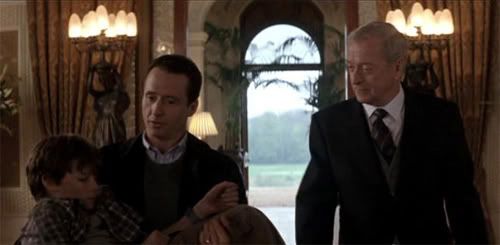



 Almost immediately she moved to the Classic Skirted Costume which is most familiar to modern fans from The Brave and the Bold cartoon. It is easily her most enduring look, having been the original costume in the 40s, returning in the 70s and remaining unchanged right up until Crisis on Infinite Earths, returning in numerous Elseworlds and other comic appearances since, and now in the Brave and the Bold and its related games and merchandise.
Almost immediately she moved to the Classic Skirted Costume which is most familiar to modern fans from The Brave and the Bold cartoon. It is easily her most enduring look, having been the original costume in the 40s, returning in the 70s and remaining unchanged right up until Crisis on Infinite Earths, returning in numerous Elseworlds and other comic appearances since, and now in the Brave and the Bold and its related games and merchandise. 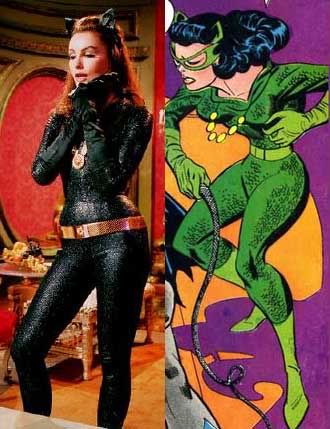
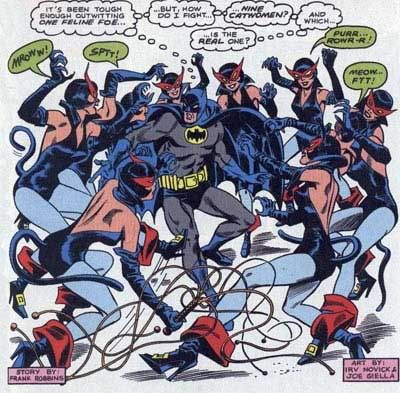 In comics, the "Go Go Boots" look came next. It seems to be universally known as the Go Go Boots Catwoman despite the fact that the '60s hair and domino mask version is actually wearing the low ankle boot more often associated with the Classic Skirted Costume. Go figure. In any case, like all bad hair and clothing choices of that period, it was quickly changed and forgotten - a lesson the present comics could learn from, god knows. Admit it was the quaaludes, change it back, and move on.
In comics, the "Go Go Boots" look came next. It seems to be universally known as the Go Go Boots Catwoman despite the fact that the '60s hair and domino mask version is actually wearing the low ankle boot more often associated with the Classic Skirted Costume. Go figure. In any case, like all bad hair and clothing choices of that period, it was quickly changed and forgotten - a lesson the present comics could learn from, god knows. Admit it was the quaaludes, change it back, and move on.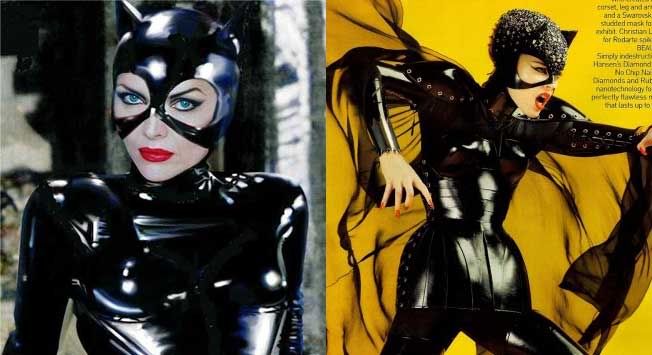
 That brings us up to a present rife with mistakes. The less said of the Halle Berry disaster, the better. The movie was a mistake from start to finish, but more than a few industry watchers have observed that the multi-million dollar fustercluck could have been avoided if DC had admitted the disaster of their Volume II comic. If you put Catwoman on the cover - or the title of a movie - and you do not deliver a Catwoman story or the true Catwoman character within, then you will fail. The Darwyn Cooke goggled costume is a warning sign (Arkham City game designers, take note!) It means "This ain't Catwoman." It means you have been taking notes from the comics division which failed because it rejected, ignored, or tried to rewrite the DNA of the character and failed accordingly. Goggles mean you have probably got it wrong. You're starting with two strikes against you. Even if the look were feline and attractive, you would not want that.
That brings us up to a present rife with mistakes. The less said of the Halle Berry disaster, the better. The movie was a mistake from start to finish, but more than a few industry watchers have observed that the multi-million dollar fustercluck could have been avoided if DC had admitted the disaster of their Volume II comic. If you put Catwoman on the cover - or the title of a movie - and you do not deliver a Catwoman story or the true Catwoman character within, then you will fail. The Darwyn Cooke goggled costume is a warning sign (Arkham City game designers, take note!) It means "This ain't Catwoman." It means you have been taking notes from the comics division which failed because it rejected, ignored, or tried to rewrite the DNA of the character and failed accordingly. Goggles mean you have probably got it wrong. You're starting with two strikes against you. Even if the look were feline and attractive, you would not want that. 